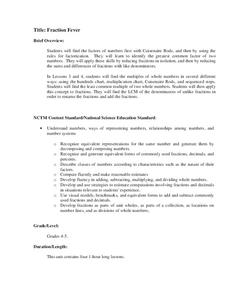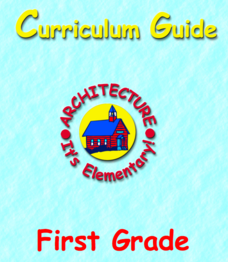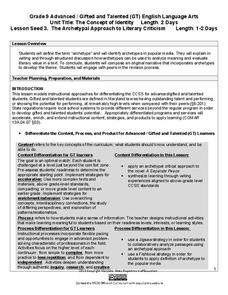Teach Engineering
Understanding Elements
Nothing says organization quite like a table. The third lesson in a six-part Mixtures and Solutions unit teaches young scientists about elements and the periodic table. They learn how the periodic table is organized and about the...
National Security Agency
Fraction Fever
This unit on fractions allows for upper-aged elementary learners to explore ways to find the greatest common factor and least common multiple of two numbers. Ultimately, young mathematicians will be able to identify equivalent fractions,...
Science Geek
Atomic Structure
The International Union of Pure and Applied Chemistry (IUPAC) was formed in 1919 and was crucial for allowing scientists to discuss findings during the Cold War. A presentation offers an introduction to atomic structure including the...
American Institute of Architects
Architecture: It's Elementary!—First Grade
Build an interest and appreciation for architecture in your young learners with this fun 10-lesson art unit. Engaging children in using their five senses, the class first observes the environment around them, paying special attention to...
Media Smarts
Looking at Newspapers: Introduction
A scavenger hunt introduces class groups to the different sections of newspapers and the different types of articles found in each section.
American Statistical Association
Exploring Geometric Probabilities with Buffon’s Coin Problem
Scholars create and perform experiments attempting to answer Buffon's Coin problem. They discover the relationships between geometry and probability, empirical and theoretical probabilities, and area of a circle and square.
Science Friday
Sublime Sublimation
Dry ice isn't dehydrated water, and young scientists learn why in this fascinating presentation. After watching a video, they complete three different activities using dry ice. Upon completion, they discuss the scientific principle.
American Farm Bureau Foundation for Agriculture
Shapes in Agriculture
It's time to get crafty with shapes! Your future farmers demonstrate their geometric ability by building a farm using triangles, circles, rectangles, and squares. But first, scholars take part in a brainstorm session inspired by their...
Curated OER
Epic Improvisation
Really? Rapping The Odyssey? Really. A discussion of the oral tradition of story telling and its links to Epic poetry sets the stage for a series of activities that encourage improvisation to integrate music into other classrooms....
Curated OER
Minerals of the Earth
Unearth this gem of a resource to use in your geology unit! With colorful images, bullet-point text, and links to related videos, it deals with the characteristics, properties, and identification of minerals. There are also slides...
Schoolwires
12th Grade Expository Reading and Writing Research Project
The beauty in this resource is the lengthy list of highly charged, controversial-issue research topics. Categories include issues of race, politics, law, environment, education, athletics, gender, and technology. After selecting a topic,...
Let's Drum!
Let's Drum!
Here's a group of exercises designed to introduce a group or class to the rhythm, as well as the basic sounds of a drum, bass and tone. Individuals investigate different types of drums and form drum circles to practice traditional rhythms.
National Park Service
Living & Non-Living Interactions
What better way to learn about ecosystems than by getting outside and observing them first hand? Accompanying a field trip to a local park or outdoor space, this series of collaborative activities engages children in learning about the...
Curated OER
Nonfiction Genre Mini-Unit: Persuasive Writing
Should primary graders have their own computers? Should animals be kept in captivity? Young writers learn how to develop and support a claim in this short unit on persuasive writing.
K12 Reader
Anne of Avonlea
Middle schoolers read a passage from Lucy Maud Montgomery's Anne of Avonlea and identify three details from the passage that show Anne is nervous as she faces her students for the first time.
Curated OER
Paradise Lost: Bloom’s Taxonomy of Thinking Processes
Chapter II of John Milton's Paradise Lost provides the text for a series of comprehension questions crafted using Bloom's Taxonomy.
Film Foundation
The Day The Earth Stood Still: The Filmmaking Process
How are films made? As part of their study of film, middle schoolers investigate the pre-production, production, and post-production process and consider the role of the director, the screenwriter, production designer, cinematographer,...
Dick Blick Art Materials
Torn Metal Collage
The work of Austrian artist Gustav Klimt is used to inspire kids to create their own mixed media works. Although designed for the special education classroom, the activity is sure to inspire all kids.
Premier Literacy
Point of View
Incorporate technology into a literature lesson with an innovative language arts lesson. Middle schoolers read an electronic version of original stories or fairy tales, and after determining the point of view, rewrite the tale from a...
Curated OER
Plate Tectonics: Sixth Grade Lesson Plans and Activities
Here is a set of pre-lab, lab, and post-lab lesson plans on plate tectonics. After completing the previous labs on volcanoes and earthquakes, sixth graders use the gained knowledge to explore plate boundaries and the movement of Earth's...
Maryland Department of Education
The Concept of Identity Lesson 2: The Historical/Biographical Approach
"How does our environment shape our identity?" After researching biographical information about John Knowles and considering how these experiences are reflected in A Separate Peace, class members consider the strengths and weaknesses of...
Maryland Department of Education
The Concept of Identity Lesson 7: Logical Fallacies
What are the effects of competition in an academic environment? The competition between the main characters in A Separate Peace motivates a series of activities that asks readers to take a stance on competition, and then to develop a...
Maryland Department of Education
The Concept of Identity Lesson 8: Propaganda in Visual Media
Visual and print propaganda are featured in a lesson that asks readers of A Separate Peace to examine the techniques used in propaganda from World War I, World War II, presidential elections, and in the novel.
Maryland Department of Education
The Concept of Identity Lesson 3: The Archetypal Approach to Literary Criticism
As class members continue their study of approaches to literary criticism, readers examine the symbolism and archetypal patterns in John Knowles' A Separate Peace, and how these parallels are used to develop a theme in the story.
Other popular searches
- Music Composers
- Famous Composers
- Classical Composers
- Composers and Decomposers
- American Composers
- Female Composers
- Film Music and Composers
- Renaissance Composers
- Art Music Composers
- Music History Composers
- Music History + Composers
- Jazz Composers

























